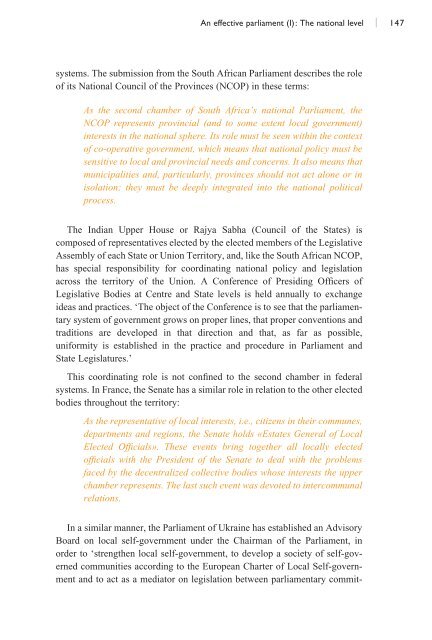PARLIAMENT AND DEMOCRACY - Inter-Parliamentary Union
PARLIAMENT AND DEMOCRACY - Inter-Parliamentary Union
PARLIAMENT AND DEMOCRACY - Inter-Parliamentary Union
Create successful ePaper yourself
Turn your PDF publications into a flip-book with our unique Google optimized e-Paper software.
An effective parliament (I): The national level I 147<br />
systems. The submission from the South African Parliament describes the role<br />
of its National Council of the Provinces (NCOP) in these terms:<br />
As the second chamber of South Africa’s national Parliament, the<br />
NCOP represents provincial (and to some extent local government)<br />
interests in the national sphere. Its role must be seen within the context<br />
of co-operative government, which means that national policy must be<br />
sensitive to local and provincial needs and concerns. It also means that<br />
municipalities and, particularly, provinces should not act alone or in<br />
isolation; they must be deeply integrated into the national political<br />
process.<br />
The Indian Upper House or Rajya Sabha (Council of the States) is<br />
composed of representatives elected by the elected members of the Legislative<br />
Assembly of each State or <strong>Union</strong> Territory, and, like the South African NCOP,<br />
has special responsibility for coordinating national policy and legislation<br />
across the territory of the <strong>Union</strong>. A Conference of Presiding Officers of<br />
Legislative Bodies at Centre and State levels is held annually to exchange<br />
ideas and practices. ‘The object of the Conference is to see that the parliamentary<br />
system of government grows on proper lines, that proper conventions and<br />
traditions are developed in that direction and that, as far as possible,<br />
uniformity is established in the practice and procedure in Parliament and<br />
State Legislatures.’<br />
This coordinating role is not confined to the second chamber in federal<br />
systems. In France, the Senate has a similar role in relation to the other elected<br />
bodies throughout the territory:<br />
As the representative of local interests, i.e., citizens in their communes,<br />
departments and regions, the Senate holds «Estates General of Local<br />
Elected Officials». These events bring together all locally elected<br />
officials with the President of the Senate to deal with the problems<br />
faced by the decentralized collective bodies whose interests the upper<br />
chamber represents. The last such event was devoted to intercommunal<br />
relations.<br />
In a similar manner, the Parliament of Ukraine has established an Advisory<br />
Board on local self-government under the Chairman of the Parliament, in<br />
order to ‘strengthen local self-government, to develop a society of self-governed<br />
communities according to the European Charter of Local Self-government<br />
and to act as a mediator on legislation between parliamentary commit-

















